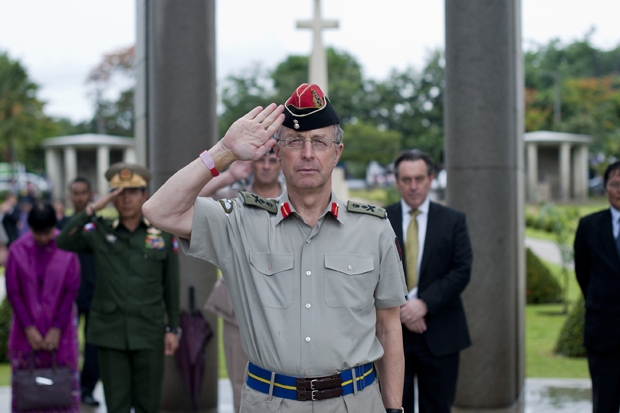I had the misfortune to meet Lord Richards on probably the darkest day of his 42 years in the military. In July 2009 I went to visit the then Commander-in-Chief UK Land Forces in his office on the edge of Salisbury plain and we spoke about his career, and the army in general. All the while staff officers ran in and out with updates and requests concerning a double IED attack which had left five soldiers of 2nd Battalion, The Rifles, dead and a dozen wounded — the single worst incident in our 13-year involvement in Afghanistan. Richards was, as the title of his auto-biography suggests, in total command of himself and the situation — eloquent but concise, knowledgeable and incisive; and while far from unfeeling, his judgment was completely unclouded by emotion. He was the model of what one would hope a four-star general to be.
His career as an officer really took off — as does the book — in 1986 when he became Brigade Major of the British Infantry contingent of the Nato armies in West Berlin. He describes well the odd mindset among soldiers who were keenly aware that, should the Soviet tank divisions ever decide to sweep west, they’d be unlikely to be stopped by anything short of tactical nuclear weapons until they hit the Channel.
However, while the strategic and tactical analysis is insightful, and the history informative, it is the peppering of personal anecdotes which makes this book so readable. This includes such oddities as guarding the last Nazi war criminal, Rudolf Hess, at Spandau — and later identifying his body — and the secondment of himself and some of his men to the chorus of the Royal Ballet when they went on tour to Germany. The ballet in question was by Stravinsky, and Richards found himself on stage each night dressed as a Russian boyar. Since they were always ‘on-call’ for a potential invasion, he wryly considers the irony which might have found him commanding a doomed counter-attack against a wave of T-72 tanks dressed as Tsarist nobleman.
He rightly highlights the great unsung triumph in the Cold War of history’s strongest military alliance, Nato. Through the consistent show of strength — from parades to training exercises — the West forced the Soviet economy into an arms race which it simply couldn’t sustain. Richards paraphrases Sun Tzu’s The Art of War aptly: ‘The height of military skill is to defeat your enemy without firing a shot.’ This is forgotten now, despite this month seeing the 25th anniversary of the fall of the Berlin Wall.
Richards was at the time much involved in our other major conflict, Northern Ireland. This was also a successful campaign, following his strategic philosophy in which military victory is only meaningful when there is a political possibility of maintaining peace afterwards.
However, he is not averse to the expedient use of force; and when it is applied he is of the view that one must go in hard — ‘clout, not dribble’. This was proved on the ground in 2000 when he was sent with a unit of a few dozen Special Forces to evacuate foreign nationals from Sierra Leone. On arrival, he saw that Freetown was set to fall to the brutalities of the Revolutionary United Front — RUF — and he calculated that even a small contingent, correctly and forcefully applied, could turn the tide against what was largely a drug-addled militia more interested in maiming civilians than soldiers.
Having managed to get 600 Regular Army flown out to back him up at short notice, and under the guise of securing the airport for evacuation, Richards arranged matters so that the RUF found themselves facing not unarmed civilians but the combined skills of 1 Para and 22 SAS. This led to amusingly difficult questions from his political masters as to why his units were engaging enemy forces some 30 miles distant from the airport they were meant to be defending. Failure — or even success mitigated by British casualties — would have ended the then Brigadier’s career; instead his action saved a city. And while it was Richards who took the risk, it was Tony Blair who took the credit.
The recurrent theme of the book is the management of politicians and their expectations: what can be done — as in Sierra Leone — and what simply can’t — for example in Syria. In the modern army, it seems, one must be more than a soldier. As one ‘civilian’ who worked with Richards closely in Afghanistan described him to me, ‘He is the soldier-diplomat incarnate.’ It comes as no surprise then that he not only rose to the highest command, Chief of the Defence Staff, but that he should write such a fascinating book on the British Army from the 1970s to today.





Comments